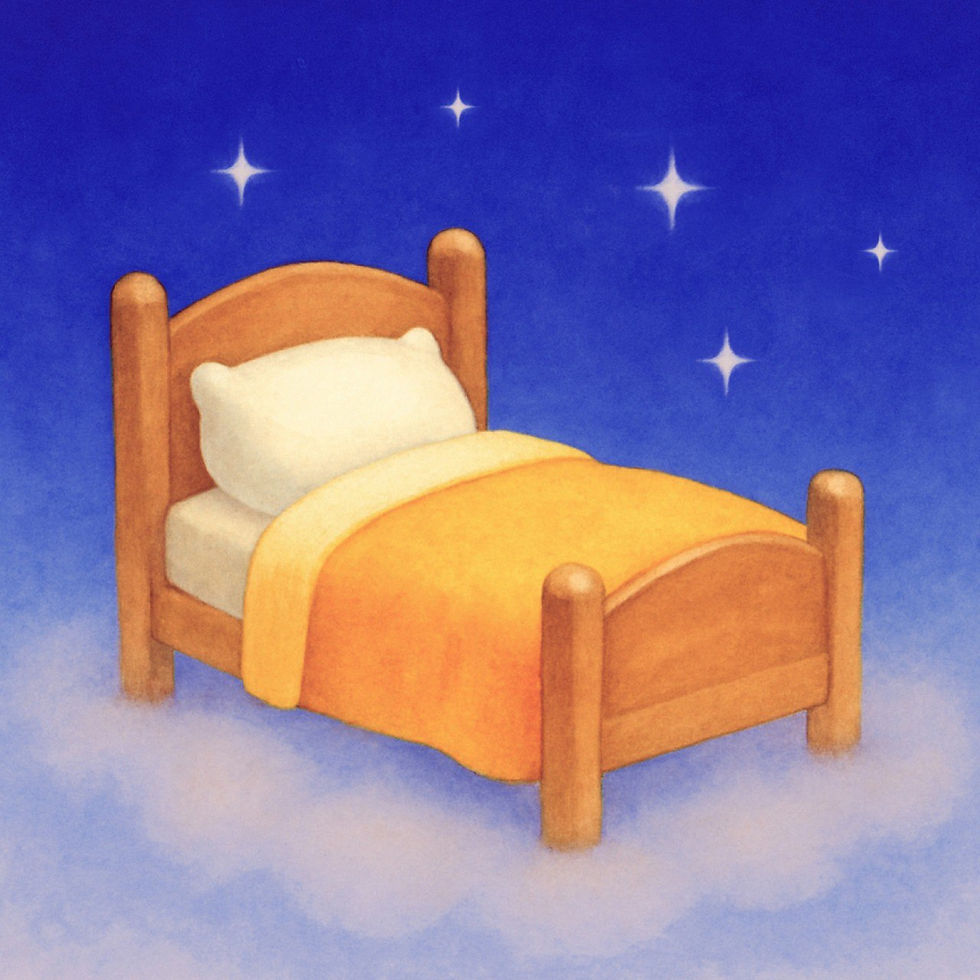I Couldn’t Sleep — So I Built a Solution
- Marina Alekseichik
- Aug 20
- 3 min read
Updated: Aug 21
By Maksim, co-founder of Zomni

I didn’t always struggle with sleep. It used to come naturally — something that happened on its own, without planning or pressure. But over time, as I began working later and bringing my screen-filled evenings into bed, something shifted.
I started feeling groggy in the mornings, so I downloaded a sleep tracker. It felt like a smart step — collect the data, fix the pattern. I liked having numbers to look at, something that made it feel like I was in control.
But I quickly became obsessed. If I hadn’t reached eight hours of sleep, I’d try to make up for it during the day. I’d nap to “catch up” and adjust my bedtime based on what the app showed. I thought I was improving things. In reality, I was chasing numbers and losing touch with what rest actually felt like.
Soon, sleep became something I had to manage, not something I could trust. My nights got shorter. My mornings, heavier. The naps made it harder to sleep at night, and that made me even more anxious. I tried harder. I tracked more. And the harder I tried, the worse it got.
Much later, I learned that this kind of obsessive focus on sleep — fueled by constant monitoring — has a name: orthosomnia. It can turn good intentions into chronic insomnia by feeding worry and hyperawareness.
As my sleep declined, so did my well-being. I felt drained, disconnected. My days blurred. My ability to focus disappeared. I read forums and stories from others, and what struck me most was how many of them described the same cycle — frustration, exhaustion, and confusion.
Many of them eventually turned to sleeping pills. Not because they wanted to, but because they were desperate. I read post after post from people who had gone down that road, hoping for relief, only to discover that the pills didn’t fix the underlying problem — and often left them feeling worse.
That’s when I knew I needed to try something different.
One night, I came across CBT-I — cognitive behavioral therapy for insomnia. It wasn’t a quick fix, but it made sense. I started reading. I took a course led by a CBT-I expert. And step by step, things began to change.
I stopped lying in bed for hours. I set a strict sleep window and gave up napping. I went outside more, moved more, focused on my breathing. I created space for my body to relearn what it once knew instinctively.
When I finally met with a sleep specialist months later and shared everything I’d done, he smiled and asked,
“You already know so much about sleep — why did you even come to see me?”
That moment made me smile too. Because he was right — I had rebuilt something I’d lost, and I wanted to help others do the same.
That’s why I created Zomni.
Zomni isn’t a sleep tracker. It doesn’t flood you with numbers. Instead, it offers a calm, structured path built around the key principles of CBT-I — principles that may seem simple on the surface, but have powerful effects when applied consistently.
CBT-I is, in many ways, a return to the basics. It teaches your brain to follow sleep patterns that were once natural — the kind of rhythms most of us learned as children, before stress, work, and modern habits disrupted them. But when those patterns break, it’s hard to recognize what’s wrong or how to fix it.
That’s where Zomni steps in.
The app helps identify what’s getting in the way — like staying in bed too long when you can’t sleep, or constantly shifting your sleep schedule. Then, it offers simple, tailored suggestions to help restore balance. It’s not about pushing or punishing. It’s about gently showing a better path, based on what actually works.
If you’re in the cycle of overthinking your sleep, trying everything and getting nowhere — I’ve been there. And I want you to know: it can get better.
Why Zomni?
The name grew out of insomnia — the very word I was Googling at 4 a.m. for weeks. But it also quietly reflects what it feels like to live without sleep.
When you go long enough without proper rest, you don’t just feel tired — you stop feeling fully alive. You move through the day in a haze, like a muted version of yourself. That half-awake, half-human state? That’s what Zomni aims to reverse.
It’s not about zombies. It’s about becoming fully human again.
Zomni helped me rebuild my sleep, and with it, my energy, clarity, and peace of mind.I hope it can do the same for you.



Comments